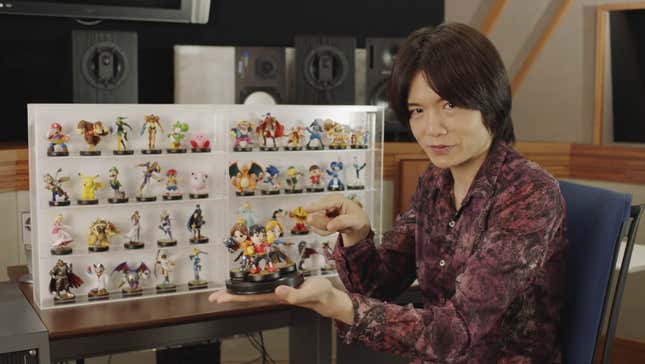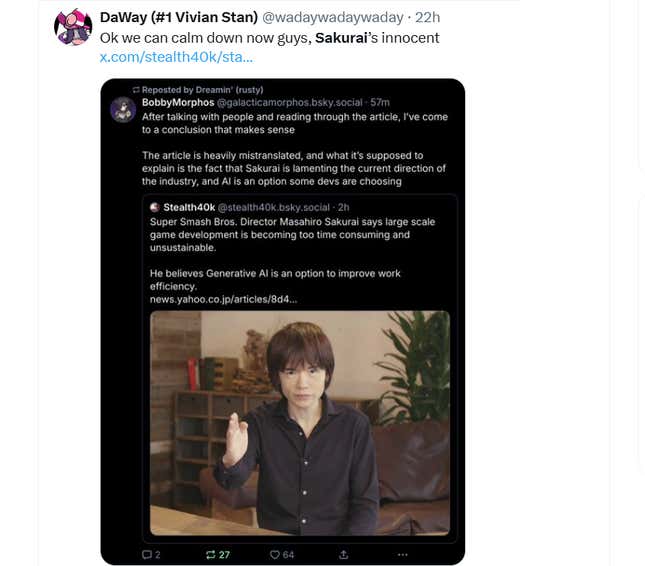
After directing Super Smash Bros. Ultimate and then taking a break from game directing to moonlight as a YouTuber and educate fans about game design, Masahiro Sakurai recently revealed he’s returned to development to work on Kirby Air Riders for Switch 2. But this past weekend, a comment Sakurai made about companies using AI in production drew harsh criticism. According to some experts, the mini-outrage was spurred on by a poor AI translation of what Sakurai actually said, and shows the pitfalls of a media ecosystem that increasingly relies on machine translation to understand a global medium.
“Super Smash Bros. Director Masahiro Sakurai says large scale game development is becoming too time consuming and unsustainable,” read a now-deleted summary of an interview Sakurai gave to ITmedia Business Online, a summary that rapidly spread on websites and subreddits over the weekend. “He believes Generative AI is an option to improve work efficiency.”
The summary relied on machine translation of what Sakurai had said, an increasingly common practice on social media where information sources for companies, many of which reside in Japan, are frequently in other languages (indeed X, formerly known as Twitter, has a translation tool directly built in, while places like Bluesky link out to Google’s tools). Amid growing criticisms that generative AI initiatives are just over-hyped plagiarism machines, many instantly lamented Sakurai’s apparent take. Et tu, Smash daddy? The revered developer notorious for working to the point of exhaustion who won fresh fans with his YouTube series was transforming into a problematic fave.
But translators and others fluent in Japanese quickly pushed back on interpretations that suggested Sakurai was outright endorsing using generative AI to make games. “It doesn’t at all come across as a full-throated endorsement so much as him shrugging his arms and saying he can’t think of much better,” Thomas James, who’s helped localize Monster Hunter Generations and Tales of Arise, among others, wrote on Bluesky. “Which is not a great look TO BE SURE, but I wanted to add my two cents as someone who can, like, read the actual interview.”

Freelance writer Kite Stenbuck, who covers games for RPG Site and reported on the interview for Siliconera, is fluent in Japaense and provided his own translation:
ITmedia: Game development is going large-scale and becoming more specialized and segmented. On the other hand, the market for indie games made by solo and small groups is also growing. How do you see the future of the gaming market?
Sakurai: To be honest, nobody knows what the future holds [TN: he used the proverb ‘The inch ahead is darkness’ which should mean that]. I think when we want to make a large-scale game like it is in the present day, it’d take so much labor that we’d go into a situation where it’s not sustainable. I feel like we cannot keep going on like this, but at this point, the one effective solution that comes to my mind would be something like Generative AI. I feel like we’ve come to a phase where we must change the schemes, for example by utilizing Generative AI to improve work efficiency. And we might enter an era where only companies that could deal well with those changes would survive.
Rather than Sakurai talking about what needs to be done or what he plans to do right now, the snippet about AI is situated in a series of hypotheticals about the future. While it’s notable that he’s not asked about AI directly, and instead brings it up himself voluntarily, it’s also one small throwaway thought in a longer interview that touches on a bunch of other topics. Plus we don’t even know specifically which tools Sakurai is think of here. Procedural generation and other techniques already prevalent in large games like Xenoblade Chronicles 3? Or actually using generative AI to make Smash Bros. character art and rig up animations for different costumes?
A good interviewer might follow up on these points but the subtle context clues that indicate the difference between wary warning and enthusiastic endorsement aren’t likely to come through in rough and dirty machine translations. “It’s the sort of nuance that a machine translator would have trouble picking up on because it means filling in blanks that it will never realize are there,” James told Kotaku. “So much of Japanese as a language, as you might be aware, operates by implication and shared assumptions between two people and with this wording in particular that Sakurai uses, no machine translation is going to reasonably pick up on what I’m talking about because the very context and tenor of the conversation itself informs how certain words and grammar are parsed in the Japanese.”
Fighting to preserve that nuance might be a losing game, especially online where so many conversations get flattened into familiar tropes and binaries to begin with. Though many threads and stories that originally shared the incomplete machine translation of Sakurai’s comments have since been locked, deleted, or updated, a less famous and popular developer probably wouldn’t get that level of follow-up and benefit of the doubt. Not to mention that there are still perfectly defensible reasons for being critical of Sakurai appearing to legitimize generative AI at all.
James argues that’s a difference between the American and Japanese contexts around AI and game development that goes deeper than translation mistakes. “AI discourse in Japan online is generally pretty far behind the west and criticism, while growing, mostly comes from outspoken individuals,” he wrote. “There is a lot of forced hype surrounding AI when it comes to advertising like in the west and certainly there are boneheads who actively shill for it, including in games. But overall at a social level, I would say it has yet to be subjected to the same level of rigor outside savvy creatives as abroad.”
The debate over what Sakurai actually said and meant is also a symptom of a growing problem in Western games media as sites lose sources and industry churn pushes out veteran staff (Kotaku once had three fluent Japanese speakers on staff at the same time). “Overall I do think it’s really concerning to see people recently trusting machine translators more than actual humans who have learned the languages,” Stenbuck told Kotaku. “Like, I do admit that the accuracy of machine translators has increased so much compared to the previous years, but there are still some phrases that are liable to be misinterpreted unless the translators know the exact context surrounding the statements.”
.